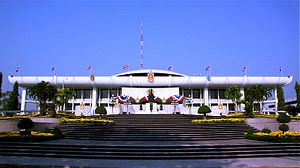The Thai Civilized Party, formerly a member of the ruling coalition, has exited the alliance due to its dissatisfaction with Prime Minister Prayut Chan-o-cha’s policy direction. This has further reduced the government’s razor-thin majority in the lower house of the parliament to just three seats. While the development is notable, it is also likely just the beginning of the challenges that the Prayut administration will face during its tumultuous tenure.
Prayut, who already had full support from the upper house of Thailand’s parliament as a result of a new constitution instituted in 2017, managed to stay in power after March’s polls with the help of a 19-party coalition in the lower house. While having a majority in the lower house is critical to pass key policies, managing the priorities of so many political parties, each pursuing their own agendas, will prove to be a key challenge.
This challenge has already manifested itself in the form of a delay in the selection of the cabinet due to internal squabbling for positions, the defection of the Thai Civilized Party, and a threat by the Thailand Forest Conservation Party to exit the coalition. The new government’s fragility, as a result of troubled internal dynamics, has become evident within the just the first few months of its tenure.
In addition, the Prayut administration is facing a unified opposition consisting of strong, vocal, and persistent leaders such as Thanathorn Juangroongruangkit of the Future Forward Party. And the opposition strongly believes that Prayut unfairly won the election by implementing the new constitution, extending campaign bans, dissolving opposition parties, and bending election rules.
The result is an opposition that is going to scrutinize Prayut’s every move and stymie legislation, something that the former junta leader has no experience with. Consequently, Prayut will struggle to operate in a democratic parliament, in which he will continue to face slews of accusations, personal attacks, and criticisms regarding his principles, credibility, and policy direction. With the background of a military leader and an autocrat, Prayut could already be seen losing his temper in the first few days of the new parliament session.
The issues are further accentuated by the fact that the government majority is severely at risk due to existing internal dissatisfaction. Maintaining a majority in the lower house will be critical for the government to pass key legislation, such as the upcoming fiscal budget, against a strong opposition that will attempt to block most major policies. There has already been strong opposition against an increase in military spending proposed in the government’s 2020 fiscal budget.
Additionally, Prayut is also facing charges against him due to his delivery of a botched oath in which he omitted the last statement on upholding and abiding by the constitution. This issue, while still developing, could significantly impact his leadership. And finally, there is the burden of a potential no-confidence vote in case dissent against the government grows. A successful vote for the opposition could completely derail the administration and transform the political dynamics of the country.
The Thai Civilized Party’s defection is just the beginning of the challenges that the Prayut government is likely to face during its term. The government will continue to have to manage internal dissent, backlash from the opposition, difficulty in passing key legislation, and challenges to its authority. In such a situation, it is difficult to be optimistic about the prospects of the Prayut administration and what it will be able to achieve during its tenure.
Ashu Agarwal is a senior analyst for Southeast Asia, based in DuckerFrontier’s Singapore office.

































